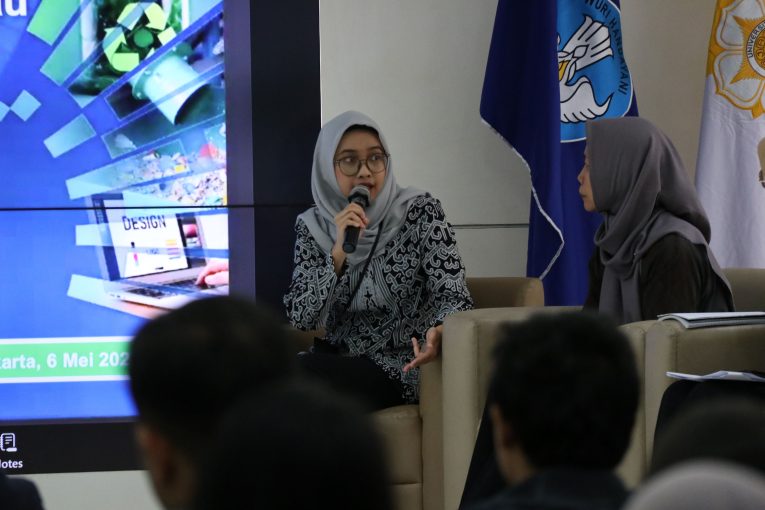
Yogyakarta, May 6th 2024─The world is experiencing a triple planetary crisis that includes climate change, pollution, and biodiversity loss. Various efforts have been made to address these issues, one of which is by adopting circular economy principles in business and daily activities. However, the understanding and implementation of circular economy is still limited to the business sphere. Responding to this, the Institute of International Studies (IIS) UGM together with the Partnership for Action on Green Economy (PAGE) through UNDP Indonesia and Bappenas organized a workshop entitled Mainstreaming Circular Economy for Transformative and Sustainable Change as an effort to mainstream circular economy principles to the grassroots level on Monday (6/5) at the Mandiri Auditorium, Faculty of Social and Political Sciences UGM.
Asri Hadiyanti Giastuti, Staff Planner at the Directorate of Environment of Bappenas, who represented Priyanto Rahmatullah, Director of Environment of Bappenas, explained that Bappenas is working to develop a roadmap and action plan for circular economy through various policies, initiatives, and concrete practices. For example, in national planning, Bappenas has encouraged sustainability aspects in Indonesia’s development through low-carbon development and mitigation and adaptation to climate change. This is in line with Sustainable Development Goal (SDG) 11 on sustainable cities and SDG 13 on climate change. However, these efforts are not without challenges. Limited funding, lack of specific regulations related to circular economy, inadequate infrastructure, and governance and institutional issues still pose challenges.
“Therefore, financial support, policy, capacity building, and collaboration are needed. Collaboration on social and technical aspects for mainstreaming this principle until everyone has a common ground on circular economy is very important,” Asri explained.
Apart from the government, the event also featured an academic, Suci Lestari Yuana, an IIS UGM researcher. According to Suci, one of the keys to mainstreaming circular economy is by producing knowledge that is based on local knowledge. Suci together with IIS UGM has initiated the concept of ‘mundane’ circular economy policy to be able to translate and bridge circular economy principles into daily activities.
“Circular economy practices, such as converting used goods into usable goods, are already widely practiced. However, not many people realize that this is an application of circular economy. The concept of circular economy needs to be bridged,” said Suci.
Furthermore, according to Junita Widiati Arfani, the initiator of the Indonesia Green Principal Award (IGRA), the implementation of circular economy is most effective when done at the grassroots level. “Changing the mindset needs to be done locally, one of which is through schools,” said Junita. According to her, schools are strategic and potential institutions because what students learn at school will generally be conveyed to their parents. It is this power that IGRA wants to utilize to mainstream circular economy principles.
The principle of circular economy is also very likely to be applied by business people, as done by Suharji Gasali through PT Amandina Bima Nusantara, a food storage company derived from PET recycling. PT ABM’s goal is to be a solution to the existing waste issue by making plastic packaging that can be used continuously without creating problems in the environment. “The carbon footprint generated when producing (packaging) continuously is 2.7 kg. Whereas, if you recycle (the carbon footprint) produced is only 1 kg,” said Suharji.
Finally, the discussion was also complemented by the presence of Tim Ngupahan, a finalist of the FLW/UNPAGE/UNDP National Youth Ideathon, who shared stories about his innovation in dealing with food waste. According to Tim Ngupahan, 37% of food waste can actually
be consumed again. Based on this, they developed a compost bank to become one of the enablers in implementing a sustainable and circular food system. The efforts made by the Ngupahan Team and PT ABM are one of the implementations of the 12th Sustainable Development Goal (SDG) on sustainable consumption and production.
